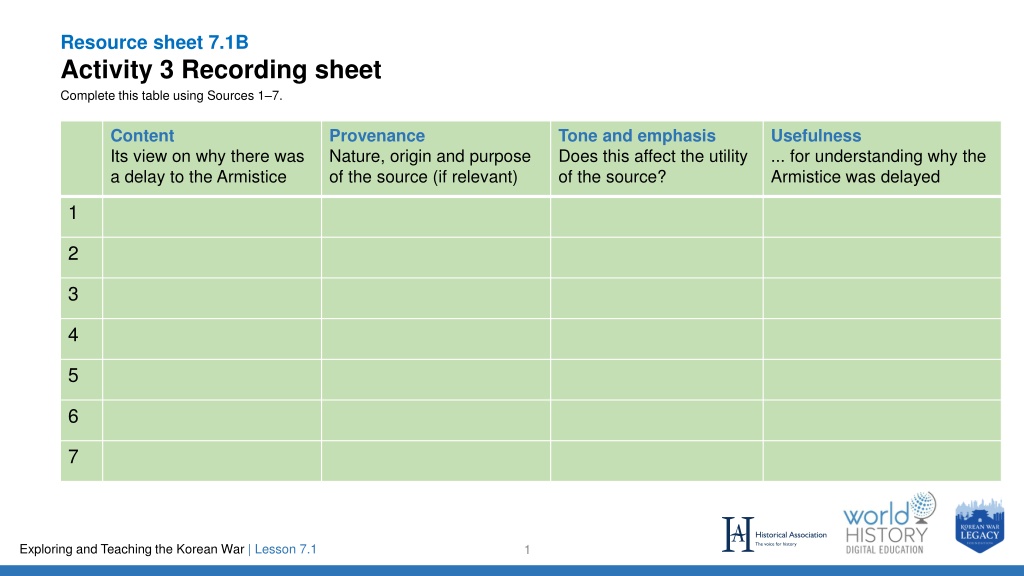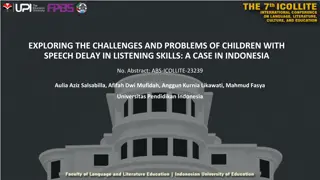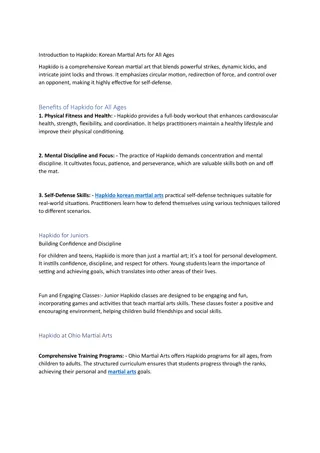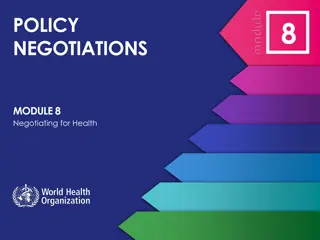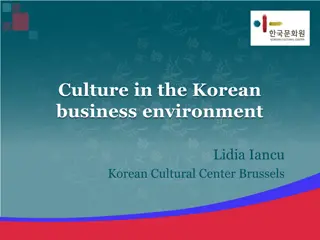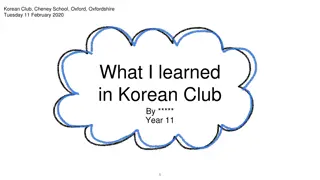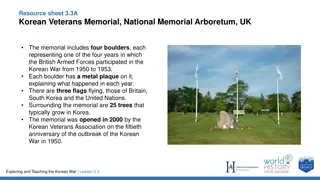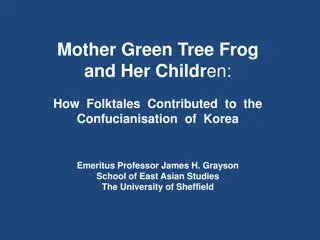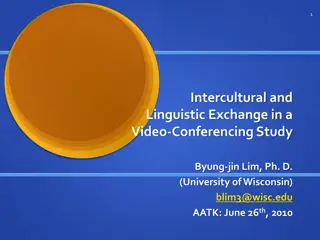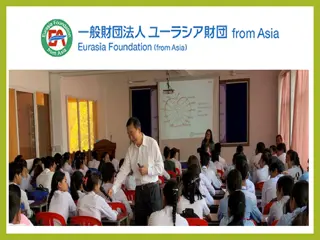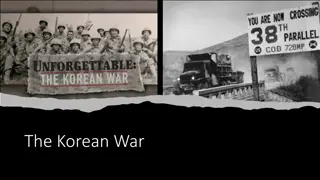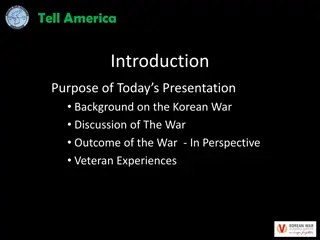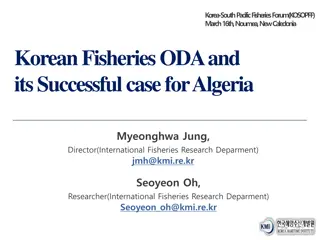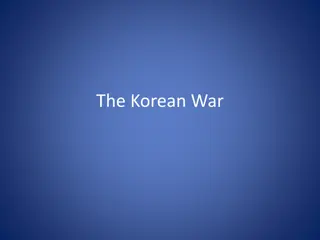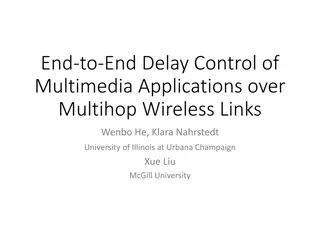Understanding Delay in the Korean Armistice Negotiations
Sources 1 to 4 provide insights into the reasons behind the delay in reaching an armistice during the Korean War. Source 1 discusses the POW question's impact, Source 2 presents Eisenhower's stance on peace efforts, Source 3 outlines Syngmam Rhee's opposition to a divided Korea, and Source 4 reflects US views on Rhee's actions.
Download Presentation

Please find below an Image/Link to download the presentation.
The content on the website is provided AS IS for your information and personal use only. It may not be sold, licensed, or shared on other websites without obtaining consent from the author. Download presentation by click this link. If you encounter any issues during the download, it is possible that the publisher has removed the file from their server.
E N D
Presentation Transcript
Resource sheet 7.1B Activity 3 Recording sheet Complete this table using Sources 1 7. Content Its view on why there was a delay to the Armistice Provenance Nature, origin and purpose of the source (if relevant) Tone and emphasis Does this affect the utility of the source? Usefulness ... for understanding why the Armistice was delayed 1 2 3 4 5 6 7 Exploring and Teaching the Korean War | Lesson 7.1 1
EVIDENCE PACK Resource sheet 7.1B Source 1: The POW question https://koreanwarlegacy.org/chapt ers/a-barrier-to-armistice-what-to- do-about-prisoners-of-war Use the text information and oral accounts of the soldier and airman for personal accounts as to why the POW question contributed to prolonging the war. Exploring and Teaching the Korean War | Lesson 7.1 2
EVIDENCE PACK Resource sheet 7.1B Source 2: Eisenhower: I shall go to Korea speech, 24 October 1952 I shall go to Korea... Carefully, then, this new administration, unfettered by past decisions and inherited mistakes, can review every factor military, political and psychological to be mobilized in speeding a just peace We can shape our psychological warfare program into a weapon capable of cracking the Communist front. The vital lesson is this: to vacillate, to appease, to placate is only to invite war vaster war bloodier war A foreign policy is the face and voice of a whole people. In rendering their verdict, the people must judge with courage and wisdom. For at this date any faltering in America s leadership is a capital offence against freedom I do not believe it a presumption for me to call the effort of all who enlisted with me a crusade. Exploring and Teaching the Korean War | Lesson 7.1 3
EVIDENCE PACK Resource sheet 7.1B Source 3: Syngmam Rhee opposing any deal that left Korea divided, 6 June 1953 The new UN proposal is unacceptable to this Government. Therefore, as a counter-proposal, we suggest a simultaneous withdrawal of both the Communist and the United Nations forces from Korea, on the condition that a Mutual Defense Pact be concluded between the Republic of Korea and the United States in advance of its carrying out. The Mutual Defense Pact shall include the following three points: 1. The United States participation on the ROK side will be automatic and instantaneous, in case of the Korean peninsula being attacked by any nation or nations. 2. Adequate supplies of arms, ammunition and general logistic materials will be given Korea for the purpose of making Korea strong enough to defend itself so as to safely release every American citizen from action in Korea. 3. The United States Air and Naval forces will remain where they are now, pending the build up of their Korean counterparts to an adequate degree, so as to deter the enemy from attempting another aggression. Exploring and Teaching the Korean War | Lesson 7.1 4
EVIDENCE PACK Resource sheet 7.1B Source 4: US views of Rhee: NSC meeting, 18 June 1953 Eisenhower displayed anger, frustration, and anxiety, which even the moderating pen of the official notetaker cannot diminish. The president asserted that in certain circumstances the United States might have no option but to withdraw from Korea. Cutler asked if Eisenhower meant that the whole Korean venture was over and we are getting out . [At this point, according to the record of the meeting] Secretary Dulles asked to be heard, and stated his belief that the disaster was not irreparable if from now on it were correctly handled. It seemed plain that President Rhee was engaged in a last desperate effort to torpedo the armistice and to force the hand of the United States. If he realizes that his attempt won t work, Rhee may well feel compelled to give up. It will then be our task to find out whether the Communists really want an armistice so badly that they will be willing to overlook the release of 25,000 of the North Korean prisoners... It was Dulles guess, however, that they were so anxious for an armistice that they would overlook what happened. Nevertheless, we must take the strongest possible line with Rhee so that he will not imagine that he can actually run the show. Exploring and Teaching the Korean War | Lesson 7.1 5
EVIDENCE PACK Resource sheet 7.1B Source 5: View of Stalin regarding the negotiations,1952 Soviet, Chinese and North Korean officials discuss the military situation in Korea and the status of armistice talks. Record of conversation 4 September 1952 Kim Il Sung: In my opinion, we have no differences of principle. We agreed with those alternatives which the Chinese comrades proposed but in view of the serious situation in which the Korean people have found themselves we are interested in the quickest possible conclusion of an armistice [peremirie]. The Chinese comrades are also interested in this. Stalin: We have discussed this issue with the Chinese delegation here. A proposal was made not to agree to the conditions about POWs offered by the Americans and to insist on our own. The opinion was expressed that if the Americans do not wish to return 20% of the Chinese and Korean POWs then 10% of the Americans ought to be held until the Chinese and Korean POWs are returned, or to say that if they do not return these 20% of Chinese and Korean POWs then 20% of their POWs will not be returned as long as they hold the Chinese and Korean POWs. It is possible that this position is even better. One could stop with this and reach a cease-fire. Continue the talks about the unreturned part of POWs after a halt in combat operations, after a cease-fire. Exploring and Teaching the Korean War | Lesson 7.1 6
EVIDENCE PACK Resource sheet 7.1B Source 6: Kim Il Sung: Time to end the war, 1953 Report that Kim Il Sung agrees that it is time to bring the war to an end, if not through military means then through negotiations, 29 March 1953 Kim Il Sung again declared that he fully agrees with the proposal of the Soviet government on the Korean question and considers that this proposal must be implemented as soon as possible. Kim Il Sung further underscored that the time has come to show initiative from our side on the question of the conclusion of the war in Korea and achievement of peace. It is necessary, Kim said, either actively to carry out military operations or to end the war; a further dragging out of the existing situation is not in the interests of the DPRK and PRC, or of the entire democratic camp. In connection with this, Kim pointed out that the losses on the Korean side at the front and in the rear (daily nearly 300 400 persons) are very significant and it is hardly advisable to conduct further discussion with the Americans regarding repatriation of a disputed number of prisoners of war. In the present conditions, Kim said, the proposal of the Soviet government is the most advisable and correct. Kim Il Sung is taking measures to prepare for the anticipated negotiations: the number of sick and wounded prisoners in the DPRK is being determined, materials for the negotiations in Panmunjom are being prepared, a statement from Pyongyang is being prepared, etc. Exploring and Teaching the Korean War | Lesson 7.1 7
EVIDENCE PACK Resource sheet 7.1B Source 7: Telegram from Kuznetsov after meeting with Mao, July 1953 Telegram from Kuznetsov to MID regarding his meeting with Mao on 28 July 1953, during which Mao talked about the steps that had led to and now had to be taken following the signing of the armistice, 29 July 1953 Among the political causes that forced the enemy to conclude an armistice, Mao noted the military contradictions in the camp of the imperialists and the significant activation of world social opinion, which is speaking out against the war in Korea. Concerning economic causes, Mao stated that in the first two years of the war the American monopolists amassed colossal profits in military orders and deliveries, but with the end of the negotiations for an armistice, and also as a result of the strengthening of the movement to end the war in Korea, their profits began to fall sharply. Having returned to the military side of the matter, Mao noted that from a purely military point of view it would not be bad to continue to strike the Americans for approximately another year in order to occupy more favorable borders along the Changan river. Further movement to the south would risk stretching out the flanks in the west and east shore of Korea. In this case the danger of landings in the rear of the Chinese-Korean troops would grow significantly. Exploring and Teaching the Korean War | Lesson 7.1 8
Plenary Overall, what do you think was the main factor that contributed towards prolonging the war until 1953? Lesson 7.1 Why did the Korean War drag on until 1953? Why do you think there was no peace treaty? Exploring and Teaching the Korean War | Lesson 7.1 9
